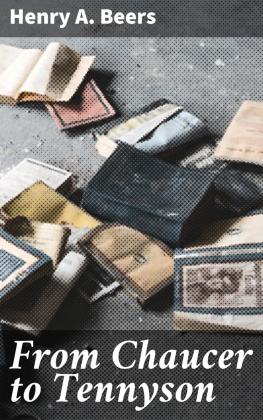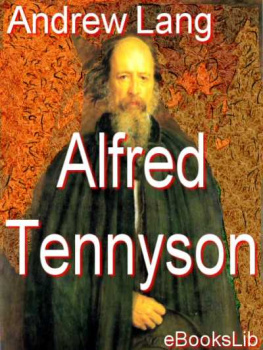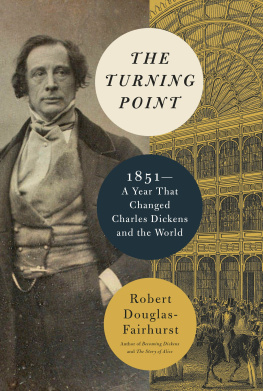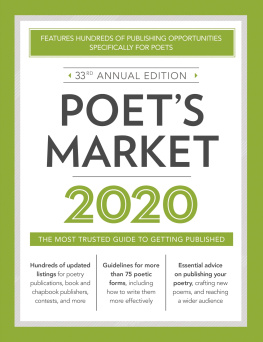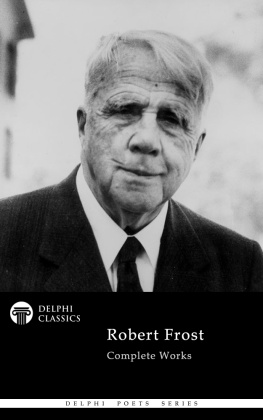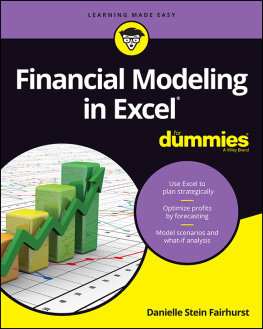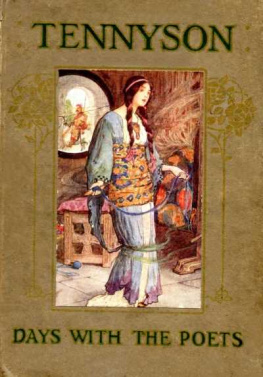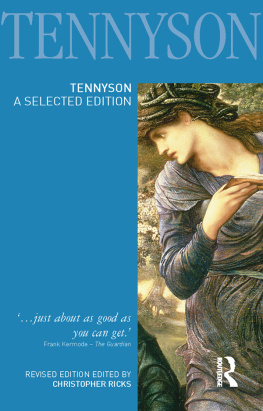Douglas-Fairhurst Robert - Tennyson Among the Poets
Here you can read online Douglas-Fairhurst Robert - Tennyson Among the Poets full text of the book (entire story) in english for free. Download pdf and epub, get meaning, cover and reviews about this ebook. year: 2009, publisher: Oxford University Press USA - OSO, genre: Art. Description of the work, (preface) as well as reviews are available. Best literature library LitArk.com created for fans of good reading and offers a wide selection of genres:
Romance novel
Science fiction
Adventure
Detective
Science
History
Home and family
Prose
Art
Politics
Computer
Non-fiction
Religion
Business
Children
Humor
Choose a favorite category and find really read worthwhile books. Enjoy immersion in the world of imagination, feel the emotions of the characters or learn something new for yourself, make an fascinating discovery.

- Book:Tennyson Among the Poets
- Author:
- Publisher:Oxford University Press USA - OSO
- Genre:
- Year:2009
- Rating:4 / 5
- Favourites:Add to favourites
- Your mark:
- 80
- 1
- 2
- 3
- 4
- 5
Tennyson Among the Poets: summary, description and annotation
We offer to read an annotation, description, summary or preface (depends on what the author of the book "Tennyson Among the Poets" wrote himself). If you haven't found the necessary information about the book — write in the comments, we will try to find it.
Tennyson Among the Poets — read online for free the complete book (whole text) full work
Below is the text of the book, divided by pages. System saving the place of the last page read, allows you to conveniently read the book "Tennyson Among the Poets" online for free, without having to search again every time where you left off. Put a bookmark, and you can go to the page where you finished reading at any time.
Font size:
Interval:
Bookmark:
Bicentenary Essays
EDITED BY
Robert Douglas-Fairhurst
and Seamus Perry


Great Clarendon Street, Oxford OX2 6DP
Oxford University Press is a department of the University of Oxford.
It furthers the Universitys objective of excellence in research, scholarship,
and education by publishing worldwide in
Oxford New York
Auckland Cape Town Dar es Salaam Hong Kong Karachi
Kuala Lumpur Madrid Melbourne Mexico City Nairobi
New Delhi Shanghai Taipei Toronto
With offices in
Argentina Austria Brazil Chile Czech Republic France Greece
Guatemala Hungary Italy Japan Poland Portugal Singapore
South Korea Switzerland Thailand Turkey Ukraine Vietnam
Oxford is a registered trade mark of Oxford University Press
in the UK and in certain other countries
Published in the United States
by Oxford University Press Inc., New York
The several contributors 2009
The moral rights of the authors have been asserted
Database right Oxford University Press (maker)
First published 2009
All rights reserved. No part of this publication may be reproduced,
stored in a retrieval system, or transmitted, in any form or by any means,
without the prior permission in writing of Oxford University Press,
or as expressly permitted by law, or under terms agreed with the appropriate
reprographics rights organization. Enquiries concerning reproduction
outside the scope of the above should be sent to the Rights Department,
Oxford University Press, at the address above
You must not circulate this book in any other binding or cover
and you must impose the same condition on any acquirer
British Library Cataloguing in Publication Data
Data available
Library of Congress Cataloging in Publication Data
Library of Congress Control Number: 2009935894
Typeset by SPI Publisher Services, Pondicherry, India
Printed in Great Britain
on acid-free paper by
the MPG Books Group, Bodmin and Kings Lynn
ISBN 9780199557134
1 3 5 7 9 10 8 6 4 2
THE editors are grateful to the Publications Board of the Tennyson Society, who first suggested the idea of this volume; and to Andrew McNeillie and Jacqueline Baker, our editors at the Press, who took it up with such enthusiasm. We would also like to thank Daniel Mallory for compiling the index.
Oxford R. D-F., S. P.
January 2009
CHAUCER reported of his Clerk of Oxenford: And gladly would he learn, and gladly teach. Tennyson learnt gladly from his poet-predecessors. That, he knew. Moreover, he taught his poet-successors gladly, even when he was no longer alive to know so, and even when what he taught had to do not with gladness but with sadness and madness. Auden said of him, notoriously, that there was little about melancholia that he didnt know; there was little else that he did.
He was of Cambridge, but it was Oxford that signally garlanded him, five years after he had been made Poet Laureate, with an honorary degree, Doctor of Civil Law. The occasion was graced by an affectionate incivility, a youthful cry (it bantered The May Queen, You must wake and call me early, call me early, mother dear): Did your mother call you early, dear? But then to Make It New by courtesyor by comic discourtesyof Tennyson proved to be one of the continuing respects in which his art was respected. The very parodies of him (Lewis Carroll), or the turns upon him (Max Beerbohm), never forget his unique unignorability. There is the friend who, seeing Tennyson light up his pipe first thing in the morning, delighted in The earliest pipe of half-awakened bards. (We are not amused.) There is the enemy who held it true that Tis better to have loved and lost | Than never to have lost at all. Perhaps even Nabokov may eventually be forgiven for remarking of an initial reading of a famous, though not very good, poem by Tennyson, Break, break, break, that For all we know, it might be a boxing referee talking in his sleep.
How Tennyson himself created afresh, thanks to earlier and other creation (To which the whole creation moves), and succeeded in doing so repeatedly yet not repetitively, is a subject to which I tried to do justice in a chapter in Allusion to the Poets. That Tennysons art subsequently not only lends itself but gives itself to such eventualities and events, some of them far off in the future and many of them divine, is the subject to which the present collection of essays does justice.
There may be two energies at work. The first, then, is Both a borrower and a lender be. The second that may be operative in Tennysons fertile case, as it would not be in (say) Audens, would be the enlarged freedom that later poets have enjoyed as a result of one manifestation of Tennysons genius, a self-knowledgeable abstention of his. For the crucial critical fact about Tennyson is that, almost alone of our great poets in the last two centuries (almost alone, because of Thomas Hardy, for one?), he abstained from literary criticism. This, without the proud humility that a poet who was valuably beholden to Tennyson was to manifest in 1911. Whether the faculty of literary criticism is the best gift that heaven has in its treasuries I cannot say, but heaven seems to think so, for assuredly it is the gift most charily bestowed. Orators and poets, sages and saints and heroes, if rare in comparison with blackberries, are yet commoner than the appearance of Halleys comet; literary critics are less common (A. E. Housman).
Tennyson left no critical essays, let alone books; his letters are all but entirely vacant of criticism, whether of his own poems or of others; and though there are certainly some piercing aperus about poets and poems recorded in Hallam Tennysons life of his father as well as in William Allinghams supreme Diary, the best of them are connected in some way with the making of the greatest of anthologies, Palgraves Golden Treasury, which was where such potentialities of Tennysons came to find realization. The poet-critic is a great exemplar: Jonson, Dryden, Pope, Johnson, Wordsworth, Coleridge, Keats, Shelley, Arnold, Hopkins, Eliot, Empson, Davie But Tennyson is a different wonder, the poet who is not a critic except (except!) in the practice of his art. So that when he presents to his successors this distinctive freedom, as against their having perhaps to come to uneasy terms with a predecessors critical strictures and ex cathedra dicta, Tennyson may be seen to offer a most unusuala differently ampleopportunity, one that has again and again (as this book demonstrates) been diversely and gladly seized.
Christopher Ricks
Robert Douglas-Fairhurst
Peter McDonald
Dinah Birch
Christopher Decker
Aidan Day
Daniel Karlin
A. A. Markley
Eric Griffiths
N. K. Sugimura
Michael ONeill
Donald S. Hair
Marion Shaw
Matthew Bevis
Richard Cronin
Kirstie Blair
Linda K. Hughes
Samantha Matthews
Font size:
Interval:
Bookmark:
Similar books «Tennyson Among the Poets»
Look at similar books to Tennyson Among the Poets. We have selected literature similar in name and meaning in the hope of providing readers with more options to find new, interesting, not yet read works.
Discussion, reviews of the book Tennyson Among the Poets and just readers' own opinions. Leave your comments, write what you think about the work, its meaning or the main characters. Specify what exactly you liked and what you didn't like, and why you think so.

